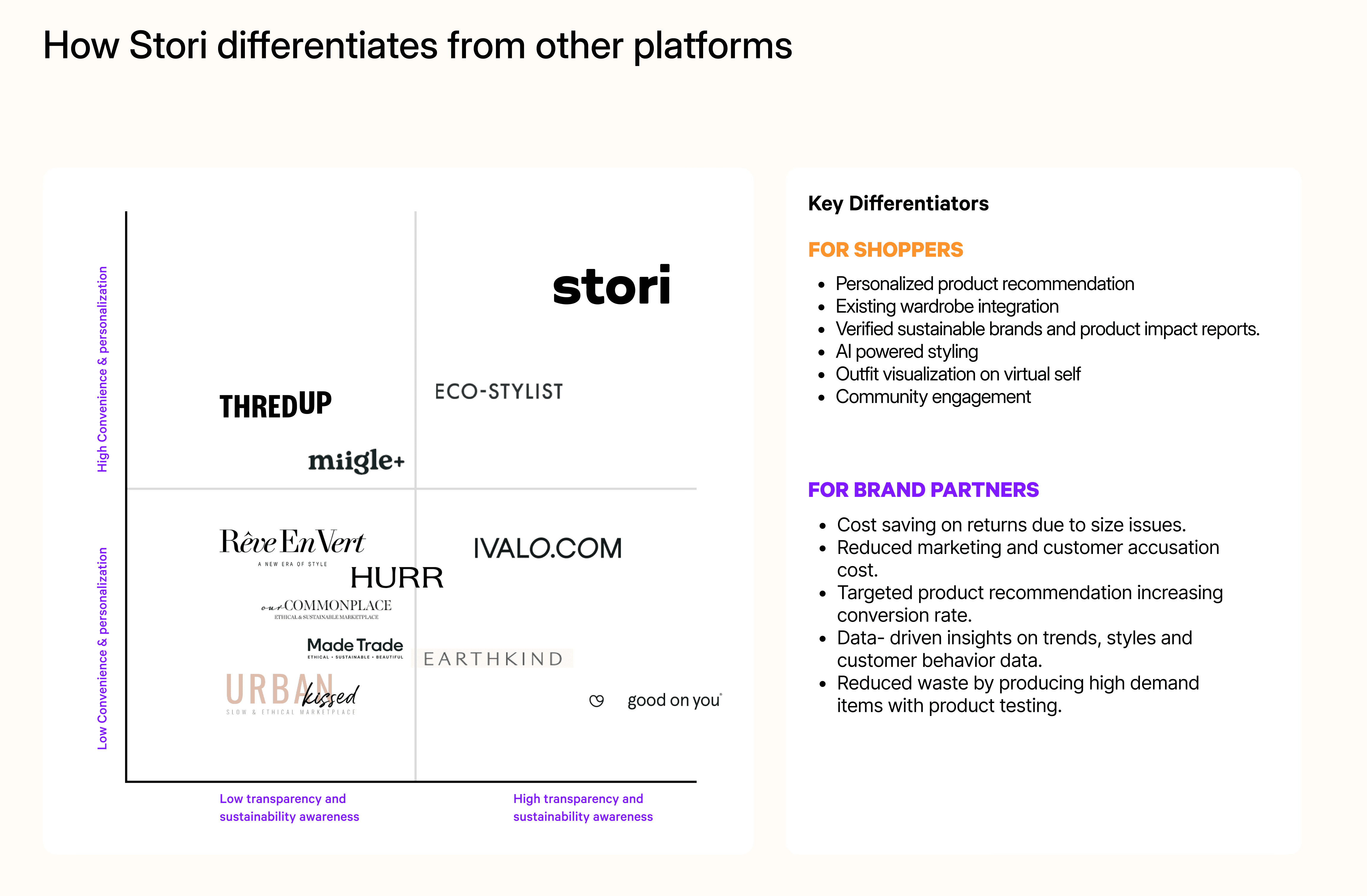The problem
75% of Gen Z & Millennials desire to buy from sustainable brands, but only 25% actually do.
People want to shop sustainably. They don't know where to start. Gen Z and Millennials experience cognitive dissonance: they care deeply about sustainability, but their actual shopping behavior doesn't align with that care.
The problem isn't a lack of intent; it's the existing platforms that add cognitive load rather than reducing it.
"How might we bridge the intention-action gap and empower consumers to make sustainable apparel their lifestyle choice?"
Solution
An AI retail platform empowering consumers to make mindful choices by integrating their existing wardrobe.
Stori reconnects users with their wardrobe before suggesting new purchases. AI generates outfit combinations from existing clothes, identifies actual gaps, and then recommends from vetted sustainable brands. Consumers make fewer, better purchases, and mindful consumption becomes a lifestyle choice, not an effort.
Understanding consumers gaps
Why good intentions don't translate to action.
I interviewed 20+ consumers and sustainable brands. The questions: why do people say sustainability matters but still buy fast fashion? What barriers stop them? The six interconnected challenges pointed to the same insight: the friction isn't about values, it's about the shopping experience itself.
Using BJ Fogg's behavior model, I synthesized that these challenges form a connected system where Ability, Motivation, and Prompt all fail at once.

I considered better filters, adding avatar, clearer labels, enhanced education. But none addressed the system. AI could learn without effort (Ability), personalize (Motivation), and time suggestions (Prompt), all at once. That's when AI became the answer, not as a feature, but as the foundation.
Analyzing competitors
Existing platforms solve one challenge but ignore the system.
Through competitive analysis and brand interviews, I discovered that no platform combines personalization, wardrobe integration, verified sustainability, and AI assistance into a seamless experience.
My positioning: What if we eliminated that trade-off?
AI makes this possible
It eliminates manual effort (digitizing wardrobes, learning preferences, and personalizing recommendations) while maintaining trust (through verified sustainability and transparent impact).

Design decisions
Designing for real people, real friction
Understanding the system failure wasn't enough: I needed to design an experience that worked for real behavior, not ideal scenarios.
I iterated on various options, continuously testing with people around me to understand what felt natural versus what added friction. Through this process, four core design decisions emerged that would define how users actually experience Stori.

The result
Four connected experiences that make mindful consumption effortless.

Tell us what matters to you
Stori learns about you by capturing your style, values, and sustainability priorities, building a personalized profile that makes every recommendation feel made for you.
AI capability: PREFERENCE LEARNING captures nuanced user inputs across values, habits, and goals.

Explore
Discover sustainable brands through need-first browsing…
Search how you think: "work trip to Miami", "casual brunch", or "winter night out". Effortlessly discover diverse styles and collections from vetted sustainable fashion brands tailored to your unique style and preferences.
AI capabilities: CONTEXT-AWARE SEARCH (NLU) + HYBRID RECOMMENDATION interprets natural language and generates personalized collections.

Educate
Make informed decisions before purchase
Make an informed decision before clicking "buy now". Every product shows verified impact data, with AI-generated outfit recommendations.
AI capabilities: NATURAL LANGUAGE PROCESSING (NLP) verifies sustainability claims + STYLE COMPATIBILITY generates outfit recommendations

Curate
Maximize your wardrobe's potential
Engages with your digital wardrobe or visualizes endless combinations on your virtual self without worrying about size, fit, or style.
AI capabilities: COMPUTER VISION (CNN) digitizes wardrobe + STYLE COMPATIBILITY MATCHING generates outfit combinations

Connect
Stay inspired beyond your purchase
Individual behavior change is hard to sustain on its own. Through community engagement, rewards, and collaborative features, you stay committed and inspired towards your journey.
AI capabilities: CONTENT RECOMMENDATION + BEHAVIORAL TRACKING personalizes challenges and community content.
Impact
Stori demonstrates how AI can humanize sustainable fashion, connecting personal style, ethical awareness, and digital intelligence without forcing users to compromise.
What This Established:
Framework connecting consumer behavior challenges to AI solutions
"AI as assistant" interaction model for implicit learning
Wardrobe-first design pattern reducing overconsumption
Design principles for behavior-change platforms
Recognition: Received a design award affirming its relevance as a forward-thinking model for technology-enabled mindful living.
Let Research Lead, Not Assumptions
Early in the project, I had strong opinions about what users needed. But forcing myself to validate every assumption through research revealed insights I wouldn't have found otherwise, like wardrobe-first being more important than I initially thought.
Always Return to the "Why"
When design challenges arose (should AI be conversational? how to structure recommendations?), I learned to anchor decisions back to research insights.
Trust the Process, Apply the Right Tools
This project taught me that structured design thinking, using the right research methods at the right time, and reflecting systematically, transforms complex problems into clear, actionable solutions.

